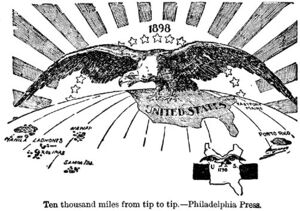政见是游戏中不同政党所持的不同政治立场。政见有很多种,每一种都有其独特的立场。执政党所持的政见对游戏有很大的影响,决定了玩家对政策各个方面的控制程度。玩家通常会花费很多精力去追求某个特定的政党,这样他就可以获得一系列想要的政策。
意识形态极大地影响了一个政党在各种问题上的立场,但个别政党可能与意识形态规范有很大不同。
政见类型
总共有五种政见,每一个议题都有两到四种立场。每一种立场都有一定程度的具体效果。
贸易政策
贸易政策是政党对自由贸易的立场。尽管事实上这个议题跨越了几个世纪,随着时间的推移采取了不同的形式,维多利亚2还是把它简化为两个截然相反的选项。
| 名称 | 最低关税 | 最高关税 |
|---|---|---|
| 保护主义 | -25% | 100% |
| 自由贸易 | -100% | 25% |
保护主义
保护主义是政府对外国进口产品征税和歧视的政策。这项政策允许玩家执行高达100%的关税,并将进口补贴限制在25%。保护主义对玩家是有用的,因为它允许玩家拥有更多的关税权力,同时限制一种相对无用的博弈机制。
自由贸易
自由贸易是一项明确的政策,目的是允许货物自由跨境流动,而不受政府官员、法律或税收的不适当干涉。自由贸易限制最高关税为25%,同时允许全额进口补贴。自由贸易并不是真正给大多数玩家带来很多游戏中的好处,但它可以有效地强制限制玩家滥用关税,也能给我们那些在现实中重视自由贸易的人带来心理利益。另一方面,进口补贴也有助于让资本家和手工业者获得本国不生产的材料,因此可以用来促进产业发展。
经济政策
经济政策决定了你的国家的经济管理体制。有四种选择,从自由市场制度到完全国有制。
自由放任
自由放任是一种不干涉的政府政策,它将市场视为进步的最终工具,并相信市场会自发地组织人类活动。这项政策使得玩家几乎无法干预经济。玩家不能建造工厂和铁路,也不能发放工业补贴或者设定工厂优先级。它的好处在于,资本家建造的工厂成本很低。当自由放任制度运作良好时,它会以很少甚至不增加国库负担的方式,诞生出强大而高效的工业巨头。当它失败时(维多利亚2的缺陷导致了它经常会这样),它会导致一个壮观而令人生厌的行业崩溃。适合初学者、不喜欢微观经济管理的玩家,或希望玩更细致或更具挑战性的经济游戏的玩家。
干涉主义
这项政策认为市场是有益于经济增长的,但有时它需要帮助。干涉主义允许玩家建造铁路、升级工厂、发放补贴和调整工厂雇佣优先级,但不能建造新的工厂。这种行动范围的扩大也带来了资本家建造工厂成本增加的惩罚。这项政策是一种介于全面计划和无计划之间的中间地带,对于那些希望调整利润率但让市场来处理其余问题的玩家来说,是很有用的。
国家资本主义
国家资本主义要求国家控制经济的“制高点”,但让市场来处理不那么重要的事情。这项政策允许玩家建造铁路、建造和升级工厂、补贴和调整工厂雇佣优先级。尽管资本家仍然可以建厂,但他们面临的成本是自由市场政策下的两倍。此外,资本家不能扩建工厂,所以需要玩家的干预才能在一个省份内建立起重要的工业。这项政策还要求最低税率为25%。这一政策被许多玩家视为理想的政策,尤其是在工业化初期、资本家不多的时候,因为它可以让玩家几乎完全控制工业生产,同时仍然允许资本家作出微薄的贡献。
计划经济
计划经济,又称中央计划经济,从社会层面上把所有经济资源的控制权交给国家。所有的经济决策都是由国家做出的,市场被排除在有关国家之外。这一政策允许玩家采取与国家资本主义相同的行动范围,但完全禁止资本家的主动性。它还规定了50%的税率。这一政策实际上是国家资本主义丑陋的兄弟,因为它带来了额外的不利因素,又没有明显的优势。然而,在《黑暗之心》之后,计划经济变得更为真实,因为负面修正因素已被移除,并且计划经济现在给工厂生产能力增加了+5%。这一政策还意味着富裕阶层对经济不再重要,所以你可以降职所有的资本家和贵族,不再屈服于满足富人阶层的负担。
宗教政策
宗教政策决定了你的国家对宗教的立场。这些选项中的每一个都代表了政府对宗教的态度,无论是在广义上还是在国家宗教的背景下。宗教政策对游戏机制没有直接影响,但它们会影响决议和事件。
无神论
无神论是道德主义的对立面。无神论并没有把宗教视为真理,而是积极地将所有的宗教打为非法。
世俗化
世俗主义的立场认为宗教在政府中没有立足之地,政府应该避免宗教事务以任何形式介入。
Pluralism
This policy holds that each citizen has the right to his own religious views, and that the religious majority (where there is one) has no right to infringe upon this free practice.
Moralism
Moralism promotes one religion above all others, and actively seeks to spread the state religion to religious minorities. If the ruling party supports Moralism, non-state-religion populations have a positive modifier to their CON which is not present for pops of the state religion.
Citizenship Policy
Citizenship policy determines the rights of ethnic minorities in your nation. Historically, the rights and rightful place of minorities in society has been a contentious issue in any number of nations, particularly in multi-racial countries (like Austria) or in very ethnically conscious nations (like Japan). In practice, this policy simply determines who gets to vote, and modifies the rate at which cultures assimilate to your primary culture. This means citizenship policy is inconsequential to those governments that do not allow voting, aside from its effects on decisions, events and assimilation.
| Name | Rules | Effects |
|---|---|---|
| Residency | Primary Culture Voting | |
| Limited Citizenship | Primary & Accepted Culture Voting | 10% Global Assimilation Rate |
| Full Citizenship | All Voting | 25% Global Assimilation Rate |
Residency
Residency allows immigrants and minorities the right to reside and work within the national borders, but no political rights. This policy gives the full vote to the primary culture and halved votes to accepted cultures. It also increases the rate at which non-state/accepted-culture pops emigrate from your nation.
Limited Citizenship
Limited citizenship allows immigrants and minorities to become citizens (possibly with certain restrictions) after a certain period, "proving" their loyalty. This policy gives the full vote to the primary culture and any accepted cultures to vote, and halved votes to all other cultures.
Full Citizenship
Full citizenship allows immigrants and minorities the full rights of citizenship, usually after some universally-accessible and relatively easy process of naturalization. This policy allows all populations to vote equally, regardless of culture.
War Policy
War policy is the embodiment of the national attitude towards the military and warfare generally. Historically, aggressive empires have glorified war to justify their actions, while smaller countries or trading nations have emphasized the power of peace. In practice, these policies affect the player's maximum defense budget, as well as the supply consumption of military units and the degree to which war exhaustion affects the nation.
Jingoism
Jingoism, sometimes overlapping with expansionism, irredentism, or imperialism, focuses on the martial virtues of warfare, and glorifies territorial expansion. Allows 100% military budget, increases supply consumption by 10%, and reduces war exhaustion effects to 50%. Also sets the flag for jingoism, which can affect decisions and events.
Jingoism is also special in that (lack of) support for it limits warmongering. Adding a war goal during an ongoing war without a corresponding casus belli requires just under 7% of the country's population to support jingoism, and causes a quarter of those pops to support pro military instead.
Pro Military
The pro military values the military for national defense and just wars. Aggressive wars may be viewed as acceptable, if not glorious. Allows 100% military budget and reduces war exhaustion effects to 70%.
Anti Military
The anti military stance disdains war, considering peace to be preferable. Believers in the anti military stance often believe change is better accomplished through peaceful means, by the market or by political means. Sets maximum military spending at 75%, increases war exhaustion effects to 120%, and decreases supply consumption by 25%.
Pacifist
Pacifists believe war is an illegitimate means of change, and even finds aggression in self defense to be suspect. Sets maximum military spending at 50%, increases war exhaustion effects to 150%, and decreases supply consumption by 50%.
Miscellaneous
Data on party issues can be accessed by locating the Paradox folder in the drive to which it is saved, then navigating to Victoria 2/common/issues.txt.
